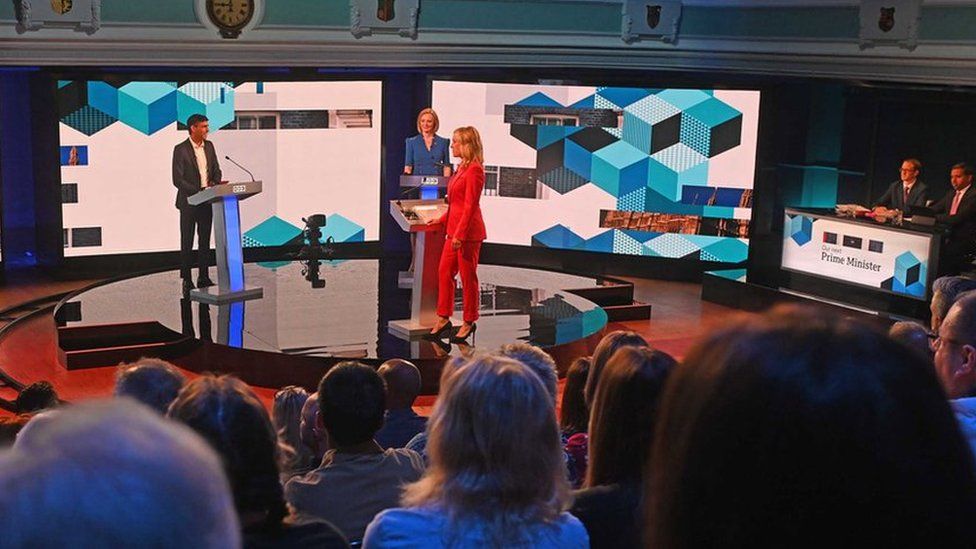ARTICLE AD BOX
By Chris Mason
Political editor, BBC News
 Image source, EPA
Image source, EPA
This was a debate which crackled with energy and tetchiness underpinned by jeopardy.
The ultimate job interview for the ultimate job in British politics; would a studio audience and an audience at home, sufficiently wooed by Boris Johnson's Conservatives to give him a huge majority in 2019, warm to the prospect of potential Prime Minister Truss or Sunak three years on?
The audience in the room with us were fascinating; among them the most powerful people in the British electorate. The most important people in UK politics are those who change their mind between Labour and the Conservatives.
Yes, those in this audience had all voted Conservative in 2019, which is clearly atypical, but plenty had done so for the very first time, and so helped deliver that whopping majority.
Our venue here in Hanley is in the seat of Stoke-on-Trent Central - a seat won by the Conservatives for the first time at the last general election. What would people here make of what has since happened in Westminster, and the prospect of a new prime minister?
Rishi Sunak, hesitant to land blows on Liz Truss in earlier debates, showed no such reticence here. Polling and surveys suggest he's some distance behind his rival and he appeared determined to attempt to shift the dial - ahead of ballot papers being sent to Conservative members in the next week or so.
What is increasingly clear is how different an economic prospectus they each offer and how willing they - and their campaigns - are to sharply criticise each other, storing up no end of political opportunity for Labour to throw it back at the winner afterwards.
We had spent days as a presentation and production team discussing the topics we ought to talk about - conscious that on plenty of issues there would be little disagreement. As hard as it is to believe, Liz Truss and Rishi Sunak served in the same cabinet of the same government until three weeks ago.
And so, yes, plenty of hugely important topics didn't get talked about. To take just one, for instance, the future of the UK and the debate about another independence referendum in Scotland.
We focused instead on the central points of disagreement. And on the economy they were stark.
I had planned to ask the candidates to be clear, if they were obfuscating and spell out explicitly that they thought their opponent's vision would make people poorer. I didn't need to. They said it explicitly in the opening 15 minutes.
A couple of other thoughts: both were full-throated in their endorsement of the levelling-up agenda. That will be one to watch to see how the winner implements that promise.
WATCH: Our Next Prime Minister - BBC debate highlights
And on questions around their character, an even bigger character hovered in the background, as if floating above the hall here: Boris Johnson.
The manner of his enforced resignation has become itself a point of debate in the battle for votes in this context - with some Conservative members deeply angry at what has happened to Mr Johnson.
Liz Truss sought to tap into that, with her ongoing loyalty to him, continuing to serve in his cabinet. For Rishi Sunak, it was about a point of principle about his conduct - but when asked to mark Mr Johnson's time as PM, he said it was only right to award him10 out of 10 for delivering Brexit, something the live audience applauded with gusto.
Oh and we also learnt that both would offer each other a job in their cabinets.
Snap opinion polling by Opinium suggests that Rishi Sunak nudged it by the narrowest of margins, with Conservative voters thinking Liz Truss did better, Labour voters that Rishi Sunak did. In summary, as I type thist, neither candidate delivered a knockout blow.
On Tuesday it's the same thing again on TalkTV, and then on Thursday the official Conservative hustings begin, in Leeds.
But Rishi Sunak's opportunities to narrow the gap in front of large audiences will soon start to shrivel. He will need to show momentum in catching Liz Truss up - and soon.

 2 years ago
17
2 years ago
17








 English (US)
English (US)